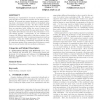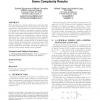406 search results - page 34 / 82 » An Activity-Based Model of Collective Knowledge |
FGR
2008
IEEE
13 years 9 months ago
2008
IEEE
Data collected through a recent web-based survey show that the perception (i.e. labeling) of a human facial expression by a human observer is a subjective process, which results i...
GECCO
2008
Springer
13 years 8 months ago
2008
Springer
The study of common, complex multifactorial diseases in genetic epidemiology is complicated by nonlinearity in the genotype-to-phenotype mapping relationship that is due, in part,...
SIGIR
2006
ACM
14 years 1 months ago
2006
ACM
Searching an organization’s document repositories for experts provides a cost effective solution for the task of expert finding. We present two general strategies to expert se...
ATAL
2005
Springer
14 years 1 months ago
2005
Springer
Many industrial or research activities are so expensive that it is often benefitable for the involved agents to cofund the construction or the purchase of a common required resou...
ECBS
2004
IEEE
13 years 11 months ago
2004
IEEE
: The available evidence in a legacy software system, which can help in its understanding and recovery of its architecture are not always sufficient. Very often the system's d...


